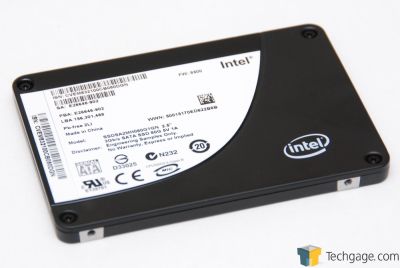From our front-page news:
Intel unveiled an interesting product last week that I somehow overlooked completely, but it's definitely cool enough to mention now. Solid-State Disks are nothing new and we've talked about them a hundred times in the past, but the company's X-25E Extreme SSD becomes (from what I know), the fastest-performing drive on the market, and yes, it will cost you.
When Intel released their MLC-based X-25M last month, jaws dropped because no one knew that MLC was capable of such extreme speeds, and it helped breath new life into the memory type. SLC memory is better in almost every way over MLC. It's faster, more durable and has a lower power consumption. The downside is that SLC is so expensive, the overall density of any equipped SSD will be lacking.
So what does it bring to the X-25E Extreme? Well, it shares the same Read speed as the X-25M, at 250MB/s, but blasts the Write speed up to 170MB/s, from 70MB/s. Its performance is unbeatable, but the same can't be said for the price, at $695 in quantities of 1,000 for the 32GB model. 64GB models are en route, but it's safe to say the demand at first will be low, and this is exclusively a workstation/server product. It's still undoubtedly fun to ogle over, though.
Intel achieves this breakthrough performance through innovations such as 10-channel NAND architecture with Native Command Queuing, proprietary controller and firmware efficient in advanced wear-leveling and low write amplification. The 32GB X25-E is capable of writing up to 4 petabytes (PB) of data over three-year period (3.7 TB/day), and double that for the 64GB version - delivering outstanding data reliability.
Source: Intel Press Release
When Intel released their MLC-based X-25M last month, jaws dropped because no one knew that MLC was capable of such extreme speeds, and it helped breath new life into the memory type. SLC memory is better in almost every way over MLC. It's faster, more durable and has a lower power consumption. The downside is that SLC is so expensive, the overall density of any equipped SSD will be lacking.
So what does it bring to the X-25E Extreme? Well, it shares the same Read speed as the X-25M, at 250MB/s, but blasts the Write speed up to 170MB/s, from 70MB/s. Its performance is unbeatable, but the same can't be said for the price, at $695 in quantities of 1,000 for the 32GB model. 64GB models are en route, but it's safe to say the demand at first will be low, and this is exclusively a workstation/server product. It's still undoubtedly fun to ogle over, though.
Intel achieves this breakthrough performance through innovations such as 10-channel NAND architecture with Native Command Queuing, proprietary controller and firmware efficient in advanced wear-leveling and low write amplification. The 32GB X25-E is capable of writing up to 4 petabytes (PB) of data over three-year period (3.7 TB/day), and double that for the 64GB version - delivering outstanding data reliability.
Source: Intel Press Release

